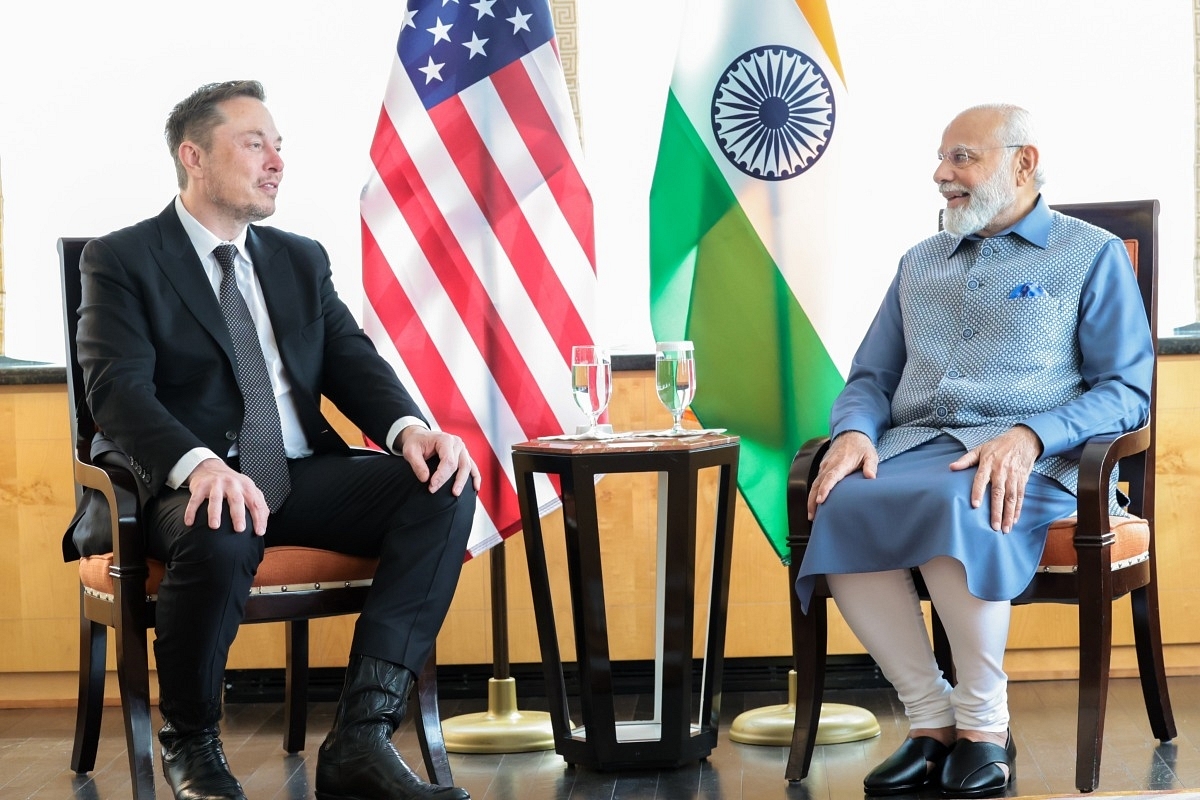Business
BYD Vs Tesla: Why China's Loss In India Could Be Elon Musk's Gain

Elon Musk with PM Modi (Twitter)
China's loss in India's electric vehicle market could present a significant opportunity for Tesla. While Tesla received a warm welcome from India for its investment proposal, its biggest rival in the electric vehicle space, China's BYD, faced increased scrutiny from New Delhi, halting its plans in the country.
The situation may pave the way for Tesla to negotiate terms for entering India's booming auto market without the competitive threat posed by BYD, which it encounters in other emerging markets like Thailand.
However, Tesla's meetings with Indian officials have been kept highly confidential, with no social media photos or publicized handshakes with executives, a departure from the usual practice after high-profile meetings.
On the other hand, BYD seems to have taken a backseat in India. Despite seeking clearance for a $1 billion investment in India previously, BYD is no longer enthusiastic about pursuing the approval. Additionally, the company faces an investigation over allegations of underpaid import tax in India.
One of the main concerns raised by Indian officials is the national security implications of Chinese-made vehicles and the potential data collection associated with them. This discomfort with Chinese automakers makes India hesitant about BYD's investment plans.
China's dominance in battery materials, battery production, and other electric vehicle technology could have an outsized effect on India's developing EV market. India has implemented tightened approval requirements for investments from China since a border clash between the two countries in 2020.
Tesla has also leveraged Chinese suppliers to reduce production costs at its Shanghai factory and now aims to bring them to India.
However, the Indian government has informed Tesla that it will allow its Chinese suppliers to enter the country only if they establish partnerships with local firms, similar to what Apple did.
On the other hand, India remains cautious about BYD's $1-billion plan, despite it being proposed as a partnership with a domestic firm.
Indian bureaucrats have told Tesla that the government is "uncomfortable with Chinese automakers," a Reuters report says.
While BYD has not commented on its investment plan for India following recent setback, Elon Musk confirmed Tesla's intention to make significant investments in the country after meeting with Indian Prime Minister Narendra Modi during his state visit to the US in June this year.
India's EV market is witnessing substantial growth, and both Tesla and BYD are eyeing opportunities to expand globally. Tesla aims to sell 20 million cars globally by 2030, while BYD was the world's largest seller of EVs and plug-in hybrids in 2022, with the majority of sales in China.
As the Indian government incentivizes companies to produce EVs locally, the country holds immense potential to serve as an export base as well.
S&P Global Mobility estimates that annual production of light electric vehicles in India will rise to 1.4 million by 2030, contributing to nearly 19% of the total forecasted production of 7.25 million.
"The future of who [between Tesla and BYD] wins in India will have some bearing on who wins globally in the EV race," Jasmeet Khurana of the World Economic Forum was quoted by Reuters as saying.
Currently, Tata Motors dominates India's EV market, with its best-selling Nexon EV priced at around $19,000.
Chinese carmaker MG Motor's ZS EV starts at $28,000, and BYD's Atto 3 retails at approximately $41,000 in India.
Tesla's identified entry point is a mid-sized gasoline SUV priced at around $24,000. Toyota Motor, Hyundai Motor, and Kia, already established the Indian market, will be its primary compeititors in this price range.
Support Swarajya's 50 Ground Reports Project & Sponsor A Story
Every general election Swarajya does a 50 ground reports project.
Aimed only at serious readers and those who appreciate the nuances of political undercurrents, the project provides a sense of India's electoral landscape. As you know, these reports are produced after considerable investment of travel, time and effort on the ground.
This time too we've kicked off the project in style and have covered over 30 constituencies already. If you're someone who appreciates such work and have enjoyed our coverage please consider sponsoring a ground report for just Rs 2999 to Rs 19,999 - it goes a long way in helping us produce more quality reportage.
You can also back this project by becoming a subscriber for as little as Rs 999 - so do click on this links and choose a plan that suits you and back us.
Click below to contribute.
Latest